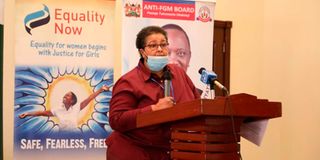Inaugural Gender Equality Moot Court Competition launched

Equality Now-Africa Region Director Ms Faiza Mohamed speaking during the launch of the toolkit guiding journalists on how to report on FGM in March. Equality Now is one of the partners spearheading the Gender Equality Moot Court Competition.
What you need to know:
- Gender Equality Moot Court Competition spearheaded by Equality Now and Catholic University of Eastern Africa has been launched.
- It is anchored on the utility of the Maputo Protocol in the advancement of women’s and girls’ rights using the legal justice system.
The inaugural Gender Equality Moot Court Competition pitting law students across the African continent was launched on Monday.
The competition spearheaded by Equality Now and Catholic University of Eastern Africa is anchored on the utility of the Maputo Protocol in the advancement of women’s and girls’ rights using the legal justice system.
It is scheduled to end on May 21. The contest will also analyse the effects of Covid-19 on State responsibility for women’s and girls’ rights in Africa.
It brings together participants from East Africa, West Africa, the Horn of Africa, and the Great Lakes Region.
Speaking during the launch, Salome Muigai a development consultant, said the gender equality moot court competition presents an opportunity to discuss how the Maputo Protocol can be utilised to make the continent a better place for women and girls.
“As we host the gender equality moot court competition this week, we will be having occasions on the importance of Maputo protocol on women’s rights in Africa, which is strategic to Solidarity for African Women's Rights (SOAWR) as we continue breathing life in to regional framework,” said Faiza Mohamed, director of Equality Now, Africa office.
Maputo Protocol
The Maputo Protocol is a binding legal framework that holds African governments to account for the continued gross violation of women’s and girls’ rights. The year 2020 was set as the deadline for ratification.
Thirteen countries are, however, yet to ratify it including three that have neither signed nor ratified it. Among the countries 13 are Burundi, the Central African Republic, Chad, Eritrea, Madagascar, Niger, the Sahrawi Arab Democratic Republic, Somalia, South Sudan, and Sudan.
The lack of ratification and implementation of the protocol has had grave consequences on the lives of women and girls on the continent, especially following the outbreak of Covid-19.
Since its adoption 18 years ago, the Maputo Protocol has contributed in shifting the trajectory on the promotion and protection of women’s human rights in Africa.




